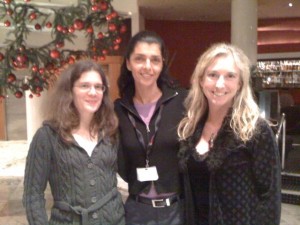Gender and Climate Change. Hmm. I was puzzled. What does gender have to do with the environment? Surely climate change doesn’t discriminate between men and women.
I was also rather sceptical. My general view – which I realize may be unpopular with many liberals – is that positive discrimination can appear patronizing, and can actually undermine the equality that it attempts to foster – by unfairly penalizing deserving members of the dominant group. I’m thinking here of the recent tendency of Oxford and Cambridge to favour state school applicants over private school students, resulting in selections that occasionally appear anomalous or even downright bizarre. I managed to get into Oxford, having been educated at zero cost to my parents, in the days before positive discrimination. So my bias – rightly or wrongly – is that individuals can create their own destinies regardless of background.
So it was with a piqued sense of curiosity and that I turned up today for my meeting with Marion Rolle and Minu Hemmati of GenderCC – Women for Climate Justice. I can report that I am now better informed – and even possible a convert to their cause.
First of all, “gender” does not mean exclusively women. If men were the under-represented half of the world’s population, we agreed, we would stand up for their rights as much as we would stand up for our own. And that it would be very nice to be in the happy position of offering such magnanimity after many years of the opposite.
Second, climate change DOES discriminate between men and women – as an example, with increasing desertification and the retreat of the glaciers in developing countries, the burden would typically fall to the women to walk the extra distance to fetch water.
Third, the factors that contribute to climate change are also gender-differentiated. Men tend to choose bigger cars and drive them faster, while women influence decisions around the home such as what foods to buy (think of those food miles) and how many children to have. So different considerations apply to different genders.
Gender CC is seeking to get a specific reference to gender included in any treaty emerging from COP15. It was apparently included in an early draft of the statement, but was subsequently removed when the draft was downsized from its original 200 pages. I wondered out loud why this had happened. Was it possibly because:
- a) The document was just too big, and something had to go
- b) It was felt that women were adequately represented, so the reference was superfluous
- c) Some countries would refuse to sign up to such an agreement due to a cultural or religious bias against female representation
- d) All of the above
- e) None of the above – something else instead?

For me, the most convincing argument was that, if such a reference to gender were included, women who might normally be denied a voice – as in (c) – would be able to point to the treaty and insist on involvement, e.g. to have a say in how any international grants for mitigation measures might be allocated. Developing countries (where women are often under-represented) may receive substantial funding from developed countries to help mitigate the effects of climate change. Kiribati is a prime example.
In a perfect world, all sectors of society would have some say in how international funding should be allocated. Big money is potentially at stake, and there may be gender-based differences of opinion as to how it should be used.
I tried thinking of this on a micro scale, which is the easiest way for my poor limited brain to ponder such questions. Based on my own experience of men, and to make some utterly sweeping assumptions based on sexual stereotypes (!), supposing a married household received a sudden windfall – maybe a small lottery win. How might the husband choose to spend it? Maybe:
- a) new sports car
- b) set of golf clubs
- c) big party?
How might the wife choose to spend it? Maybe:
- a) new clothes for the children
- b) new clothes for herself
- c) a week in a health spa?
Now please don’t come down on me like a ton of bricks. I am not a girlie girl myself (you knew that) so I would be more likely to spend a lottery win on creating a foundation or buying a smallholding in the Outer Hebrides. And many men would no doubt choose to treat the children and/or the wife to something really special. But I think you get my gist. Men and women, although equally able and intelligent, have different priorities. And it is a fact of 21st century life that women, for whatever reasons, comprise far less than 50% of national decision-makers.
So I think the concept of a reference to gender has some merit. My true preference would be to see the issue remedied at its roots – by having fairer representation for ALL at the decision-making level, so that all issues were addressed by a truly representative body (and whether that government takes place at a national or sub-national level is a question for another day, another blog).

But change on that scale is not going to happen in the next 2 weeks. So for now what is the best way to go? I’d like to throw this open to debate. Do you agree that there should be a specific reference to gender in any climate treaty? Are there any other under-represented groups who should also be specifically mentioned (maybe indigenous peoples)? Is there an opportunity here to set a precedent for future international treaties?
Comments, please!
Other Stuff:
First meeting today was with Frans Jacobi, a visual artist from Copenhagen. He is starting an exploration of the field of activism surrounding the COP15 in Copenhagen. He will be blogging about this here. Each person he speaks with is then supposed to send him on to another person and this ‘chain’ will be the itinerary for his exploration. The blog and this trip will form a part of his PhD: ‘Aesthetics of Resistance’. So we had a very interesting chat and I then passed him along to Polly Higgins. Watch that space!
This evening I went to a Rotary Club presentation by a British explorer – the magnificently named Ripley Davenport. The evening ended with dinner at the Radisson Blu. I sat between two guys from Shelterbox, who know my friend Sally Kettle, veteran of 3 Atlantic rows. Her final row was with the Rowgirls in 2005, the same year I rowed the Atlantic, and they were raising funds for Shelterbox. A very worthwhile cause, and I have volunteered to join their Shelterbox Response Team to help deploy their aid boxes to disaster zones. As extreme weather events increase in frequency and severity, these life support boxes and the response teams will become even more vitally important, and I’d love the chance to help on the practical level as well as the inspirational level.


I’m sorry, but firstly, Man-Made Climate Change is simply not a fact, especially since the East Anglian University (the UN’s official climate data research center) has been caught lying and deceiving about the global temperature rise.
And a heavy tax on CO2 will hurt the poor the most. It will hurt women a lot. It will lower everyone’s standard of living and only benefit the Environmental oligarchs.
It will simply tax industrialized nations and move the polluting to China and India.
I applaud your wanting to help women, but world taxation on CO2 will hurt women greatly.
Oh darn it! I broke my resolution not to talk about climate change – see https://www.rozsavage.com/2009/11/10/lets-forget-about-climate-change/ – and now it’s come back to bite me. Really difficult to be at a climate change conference and not mention climate change…
Will henceforth attempt to stick to resolution to focus on sustainability – a positive message -and not the politically and emotionally laden topic of C****** C*****. Because I’m not a politician, a scientist, or an economist – but I do know that we can’t continue to treat the earth this way and get away with it.
To be honest, I have no idea how a 200+ page treaty will be structured or organized, and what sort of scope it will try to cover, so I don’t feel terribly qualified to debate it. Asking that it have a “reference to gender” is pretty vague to my mind.
My gut response is to err on the side of simplicity in creating an agreement that one hopes will succeed with many countries and many cultures, and to include an appeal process to cover cases in which the simplicity does not address particular areas that need a closer look.
It seems to me that things would be less muddled if they stick to ruling on Cause > Effect, and possibly have some sort of Purpose clause that grants that some things are worth creating a little more detriment in the short term if the good it does in the long term vastly overwhelms the initial damage.
In the case of individuals, would it not be better to address behaviors rather than gender? The same sort of case might be made for the concerns of urban dwellers vs. rural dweller, for instance, and once you start making more and more distinctions, it’s like too many cooks in the kitchen and all the energy ends up going toward meetings and planning and nothing ever gets done. Avoid creating factions.
We all seem to still work together once in a while, but I’ve seen my community go from identifying as gay; to gay and lesbian; to gay, lesbian and bi; to gay, lesbian, bi, trans; to gay, lesbian, bi, trans, queer, friends, family and supporters. It makes our acronyms very long, so it’s always better focus on our common purpose and just make sure that everyone is able to participate in working toward that purpose.
Granted, that’s always easier said than done.
I agree with Joan in Atlanta, Roz.
Too many cooks in the kitchen, and you’ll forget what the original recipe was all about.
Well thought out and well said, Joan. KISS applies, especially with so many disparate parties. We have to minimize the hurdles to getting agreement now. If we can’t nail down binding reductions that will take the atmospheric concentration of CO2 back to 350 ppm, there will be no opportunity to fix social inequities and injustice because the climate chaos will create social chaos. In fact, KISS also applies to the mechanics of a meaningful carbon reduction plan … and I agree with jim Hansen’s “carbon fee at the wellhead, mine or port of entry, and 100% dividend” (without offsets) concept over “cap and trade” (with offsets) for all the reasons he has explained in his publications, papers, letters and OpEds and in his book Storms of My Grandchildren: The Truth About the Coming Climate Catastrophe and Our Last Chance to Save Humanity.
(I too generally agree with Joan above.)
Did you read all the comments on your “lets-forget-about-climate-change” post?
Have you taken up my challenge there, to tell your COP15 companions “it doesn’t matter whether we believe in climate change or not” (whereupon I hoped they might convince you otherwise)?
I take your retreat to “sustainability” and talk of “international grants for mitigation” as disturbing evidence that you have lost sight of our common 350.org goal. That challenge is sufficiently difficult that diversion of funds (and mindshare) to the foreign aid sinkhole could mean failure to rein in CO2 to the degree necessary. Moreover, inclusion of a foreign aid agenda in any treaty would likely render it politically unacceptable to many countries.
I wouldn’t be working in the US without being the beneficiary of two gender-related initiatives. I like the idea of using some of your gender-related illustrations – women carrying water, men buying big vehicles – to gain support for sustainability initiatives, but not for the treaty – too fine-grained.
It may be better to focus on people’s jobs and roles.
Follow-on projects having goals, initiatives and prizes that help those unable to help themselves seem a good idea. Have a follow-on project (that is not part of a treaty, but has timeline, funding, location, PR and stats) to reduce the number of “human water carriers” or “inefficient vehicle (clunker) buyers”. Some of these projects will already exist and post-Copenhagen can be used to promote them.
Yes, Christopher, I have discussed the climate change vs sustainability focus with many people, and so far the response has been overwhelmingly positive. Of course, maybe I just haven’t allowed room for dissent (!!) but generally the feeling is that YES, we DO need something positive to move towards rather than a problem to flee from. And that mentioning climate change puts people into entrenched positions, while a focus on sustainability opens up the debate.
And don’t worry, I absolutely have NOT lost sight of the 350.goal, no matter what your interpretation. I was not advocating international grants for mitigation – merely reporting a conversation. Same as I wasn’t advocating (in fact, did not even mention!) a CO2 tax, Yosa. I haven’t taken a position on grants and taxation, as this is simply not my area of expertise. I will leave those discussions to people who know what they are talking about! I know my limits – and my perspective is on the bigger picture.
Oops! I have been corrected regarding Oxford admissions policy. Here is a clarification, which I will republish as part of tomorrow’s blog too: Oxford is very clear that it does not favour one group of people over another. It looks purely for passion for their subject and academic potential in those who are predicted 3 As at A level, or equivalent, who apply. It does not go in for social engineering. What it is doing is spending time & money trying to encourage a wider group of people to think that Oxford might be the right place for them to apply to, as currently there are a lot of people from non traditional backgrounds who don’t even consider them.
Many thanks to the friend who pointed out my misleading and ill-informed statement above.
Is there any chance you remember the topic of the Rotary Club presentation by Ripley Davenport? There is a method and madness behind the question.
Oooh, now you’re testing me. It was 3 years ago and a lot has happened since then! Can you remind me?
Hi Roz, sorry to be so slow to respond. I am researching an article about Ripley Davenport. When he spoke to Copenhagen Rotary three years ago, he was looking for sponsorship for a solo trek across Mongolia. But he claims to have also done one man treks across the Namib and Karakum Deserts (both in 1998). I wondered if his talk was about what he PLANNED to do (Mongolia), or whether it touched on what he HAD done(Africa and Asia). Whether you remember slides or other details presented about trekking through diamond fields with camels… that sort of thing.
On the day you heard him speak in 2009 Mr. Davenport’s entire reputation rested on those 1998 Asia/Africa treks. He had yet to set foot in Mongolia. Yet Mr. Davenport can’t or won’t produce any documentation to prove that he actually did the Asia/Africa treks.
Without any cooperation from Davenport, my research has to reach out to those who have heard him speak.
thanks for whatever recollection you can muster. And Ripley Davenport is his nom de adventure, not his birth name. I’d be happy to continue via FB or direct email rett139@yahoo.com Thanks Kent Madin